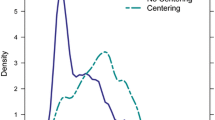Abstract
Objective: This study examined the effects of prenatal care and the timing of its initiation on birth weight and gestational age outcomes among women in a state-wide Medicaid enhanced prenatal care program. Methods: Ordinary Least Squares and logistic regression analyses were performed using data on 88,196 births in New Jersey between 1988 and 1996. A large number of potentially confounding factors were included. Results: Initiating prenatal care in the first trimester was associated with a 56 g advantage in birth weight (p = .01) compared to no care. Initiating prenatal care in the first or second trimester was associated with a 1 day advantage in gestational age (p = .05). There were no significant effects of prenatal care, initiated in any trimester, on low-birth weight. Initiating care in the first versus the second trimester had no effect on the probability of delivering preterm. The findings did not vary by sociodemographic subgroup. Conclusion: This study provides support for claims that there is little that prenatal care can do to improve aggregate birth outcomes because most pregnancy complications are the result of behaviors and life circumstances that precede the pregnancy and are very difficult to reverse. Prenatal care, even with enhanced services, appears to offer too little, too late.
Similar content being viewed by others
REFERENCES
UNICEF (United Nations Children’s Fund). The state of the world’s children 2003. New York: Oxford University Press, 2003.
Kogan MD, Martin JA, Alexander GR, Kotelchuck M, Ventura SJ, Frigoletto FD. The changing pattern of prenatal care utilization in the United States, 1981–1995, using different prenatal care indices. JAMA 1998;279:1623–8.
Howell EM. The impact of the Medicaid expansions for pregnant women: A synthesis of the evidence. Med Care Res Rev 2001;58:3–30.
Currie J, Gruber J. Saving babies: The efficacy and cost of recent changes in the Medicaid eligibility of pregnant women. J Polit Econ 1996;104:1263–96.
Dubay L, Joyce T, Kaestner R, Kenney GM. Changes in prenatal care timing and low birth weight by race and socioeconomic status: Implications for the Medicaid expansions for pregnant women. Health Serv Res 2001;36:373–98.
Martin J, Hamilton B, Ventura S, Menacker F, Munson M. Births: Final Data for 2000, National Vital Statistics Reports 52, no. 10. Hyattsville, Maryland: National Center for Health Statistics, February 12, 2002.
Alexander G, Korenbrot C. The role of prenatal care in preventing low birth weight. Future Child 1995;5:103–20.
Fiscella K. Does prenatal care improve birth outcomes? A critical review. Obstet Gynecol 1995;85:468–79.
Huntington J, Connell F. For every dollar spent—the cost-savings argument for prenatal care. N Engl J Med 1994;331:1303–07.
Alexander G, Kotelchuck M. Assessing the role and effectiveness of prenatal care: History, challenges, and directions for future research. Public Health Rep 2001;116:306–16.
Lu MC, Tache V, Alexander GR, Kotelchuck M, Halfon N. Preventing low birth weight: Is prenatal care the answer? J Matern Fet Neo Med 2003;13:362–80.
Reichman NE, Florio MJ. The effects of enriched prenatal care services on Medicaid birth outcomes in New Jersey. J Health Econ 1996;15:455–76.
Joyce T. Impact of augmented prenatal care on birth outcomes of Medicaid recipients in New York City. J Health Econ 1999;18:31–67.
Piper J, Ray W, Griffin M. Effects of Medicaid eligibility expansion on prenatal care and pregnancy outcome in Tennessee. JAMA 1990;264:2219–23.
Haas JS, Udvarhelyi S, Epstein AM. The effect of health coverage for uninsured pregnant women on maternal health and the use of cesarean section. JAMA 1993;270:61–4.
Epstein A, Newhouse J. Impact of Medicaid expansion on early prenatal care and health outcomes. Health Care Finan Rev 1998;19:85–99.
Klerman LV, Ramey SL, Goldenberg RL, Marbury S, Hou J, Cliver SP. A randomized trial of augmented prenatal care for multiple-risk, Medicaid-eligible African American women. Am J Public Health 2001;91:105–11.
Reichman NE, Teitler JO. Effects of psychosocial risk factors and prenatal interventions on birth weight: Evidence from New Jersey’s HealthStart Program. Perspect Sex Reprod Health 2003;35:130–7.
Mozurkewich EL, Luke B. Avni M, Wolf FM. Working conditions and adverse pregnancy outcome: A meta-analysis. Obstet Gynecol 2000;95:623–35.
Chomitz VR, Cheung LWY, Lieberman E. The role of lifestyle in preventing low birth weight. Future Child 1995;5:121–38.
Institute of Medicine, Committee to Study the Prevention of Low-Birth Weight. Preventing low birth weight Washington, DC: National Academy Press, 1985.
Nathanielsz PW. The role of basic science in preventing low-birth weight. Future Child 1995;5:57–70.
Lockwood C. Predicting premature delivery—no easy task. N Engl J Med 2002;346:282–84.
Bell JF, Zimmerman FJ. Selection bias in prenatal care use by Medicaid recipients. Matern Child Health J 2003;7:239–52.
Bitler M, Currie J. Does WIC work? The effects of WIC on pregnancy and birth outcomes. J Policy Analy Manag 2005;24:73–91.
Kowaleski-Jones L, Duncan G. Effects of participation in the WIC program on birthweight: Evidence from the National Longitudinal Survey of Youth. Am J Public Health 2002;92:799–803.
Author information
Authors and Affiliations
Corresponding author
Rights and permissions
About this article
Cite this article
Reichman, N.E., Teitler, J.O. Timing of Enhanced Prenatal Care and Birth Outcomes in New Jersey’s HealthStart Program. Matern Child Health J 9, 151–158 (2005). https://doi.org/10.1007/s10995-005-4905-3
Issue Date:
DOI: https://doi.org/10.1007/s10995-005-4905-3




